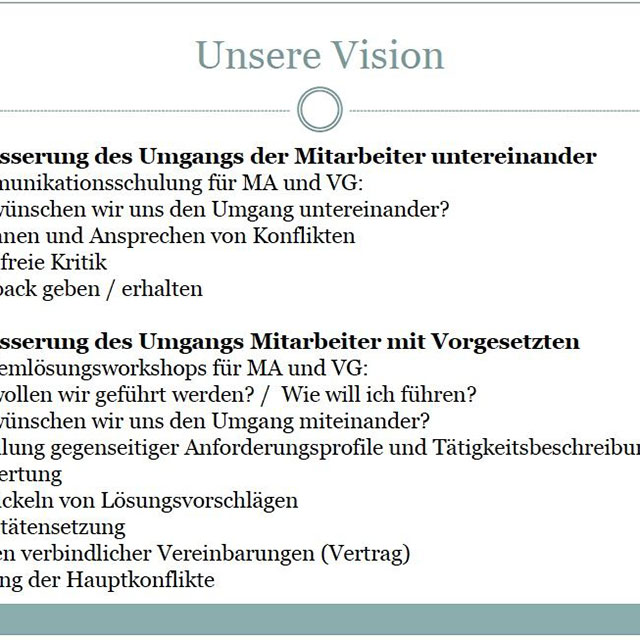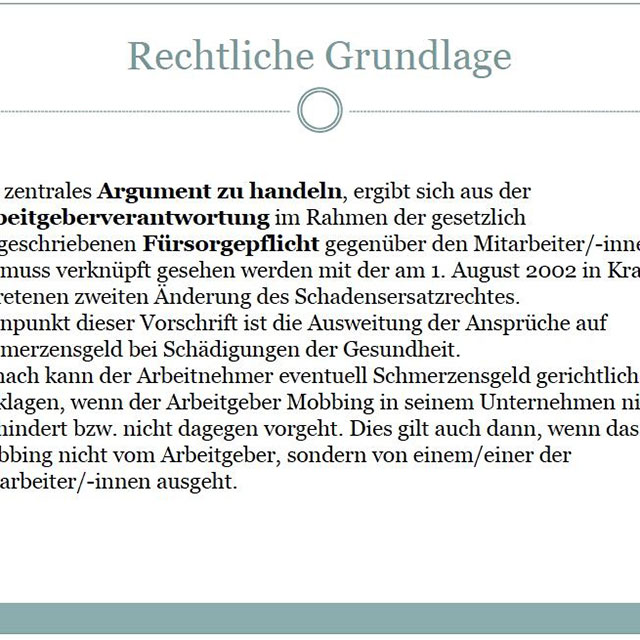The work council as an instrument to solutions
Work councils are struggling with a bad reputation, especially on the part of employers. In reality, though, the workers’ representatives could be a significant, innovative multiplier, taking on the role of “preventer” which is often attributed to them. However, that does not necessarily correspond with reality.
This is good to see in the example of a DAX-listed company with which we are in contact as part of the Cultural Change Project. A newly appointed CEO implemented a Lean Strategy, which had demonstrable negative consequences for the company atmosphere. Even well-functioning departments had to follow those new orders. As a result, the employees felt that their autonomy was sharply curtailed.
They felt less effective. Subsequently, the proposed “improvements” through the new Lean Standards had an opposing effect on the corporate climate. The deterioration became evident, varying in degrees from department to department, with the corporate mood taking the biggest hit. A team survey in the context of occupational health management revealed that out of 60 staff members, only 11 percent were satisfied with the climate they worked in. Management responded to this disastrous outcome with training workshops for the CEOs and line managers. To improve the situation, the team itself received training. However, the positive effect was brief. Only a few weeks on, the climate at work was rated poor once again.
The training apparently did not resolve the core problem. The department continued to suffer from a lack of self-efficacy caused by the implementation of the Lean Strategy. The predefined workflow cut staff off from their own action-taking, creative, and decision-making potential. Previously the team solved technical and interpersonal problems mainly through reflection. Now they had to operate by the imposed strategies of their management. Technical problem solving became almost impossible for the team. This problem extended further out into every interpersonal problem-solving process as well. Eventually, all workers stopped enjoying their daily work.
Finally, two work council members took matters into their own hands and initiated contact with the company’s social services. From within the company they wanted to start a process which sustainably would improve the overall mood. The supporting idea was that solutions cannot be dictated from the outside, but have to come from within the system.
Departments and work council members developed a solution strategy. However, at the beginning they had to face a lot of resistance. Neither the team nor the head of the department, down to the immediate supervisor and the site council had—after such a long and frustrating work experience—any faith that they could get things back on track. Only the production manager on site would listen. For a pilot group, he permitted the solution strategy to be implemented.
The methods the work council team came up with were simple and easy to use. The pilot group consisting of team members and superiors was a combination of transactional analysis and fragments of solution-focused short-term therapy. As you will see, even simple recipes can bring change. It took only a very short time before positive experiences could be reported. Within the pilot group the head of the department and other superiors noticed that the winds of change had begun. Employees rediscovered their long-suppressed problem-solving potential and once again started to get in touch with each other and their superiors. Through the newly learned techniques, the group found a common language and, thus, a deeper understanding of others. This strengthened the team spirit as well as their joint solving skills.
We think that the project of the DAX group is exceptional. Proactively the work council has solved a challenge which management was not able to do. Neither the administration nor the management-appointed external trainers had the sufficient confidence of the employees to initiate credible change. Therefore, the work council recognized its crucial role. Through its commitment, the situation of staff, as well as that of employers, has noticeably improved.


